Chapter 10 Jacksonian Democracy PDF

| Title | Chapter 10 Jacksonian Democracy |
|---|---|
| Course | US history |
| Institution | High School - USA |
| Pages | 4 |
| File Size | 127.7 KB |
| File Type | |
| Total Downloads | 46 |
| Total Views | 158 |
Summary
Notes on Chapter 10 apush. ...
Description
Chapter 10 Jacksonian Democracy New Democracy- moving west in search of land, land is now common so right to vote becomes if you're an adult white male. Unprecedented amount of people turning out to vote common men Hartford Convention related. Andrew Jackson first president who didn’t come from wealth or privilege Spoils System - “to the victor go the spoils.” Victorious political party will reward its support with government jobs. Relies on the idea that political office is simple enough for any upstanding american to do. Rotation in office - no government official should hold their position for too long. Fresh idea, new perspective, new people. Mutually exclusive to get new people who support you need new jobs Quality of federal services declined. Corruption went up. Kitchen Cabinet - remember for corruption occupied jobs because they were friend of Jackson. Martin Van Buren one exception, he was qualified. Jackson view of the Government: distrust of government, but trust himself. Earns the nickname King Andrew the first. Acts like a monarch. Whig party with Clay will class him that because of how the whig were what the patriots were called and their standing up to King Andrew. Jackson veto more bills than every previous president combined. This is undemocratic because the people are represented in congress and Jackson just keep veto them. 3 Major Topics- Indian Removal, Bank War, Nullification Crisis Indian Removal Jackson will clear “Old Southwest” Indians to make room for white settlement. Congress passes Indian Removal Act- involuntary relocation of 1,000 native americans west to reservation in Oklahoma. Claim it was for their own protection and that they had a “choice” But if they stayed they would be subjected to state law(under state law natives have no rights). Worcester v Georgia - 1832 famous quote from Jackson “ John Marshall has made his decision now let him enforce it.” Creeks war - Jackson sends Federal troops to relocate Creeks who are resisting. Second Seminole War - bloodiest and costliest Indian war in American history. Trail of Tears - forced relocation of Cherokee from homeland in Georgia to Indian Reservation in Oklahoma Bank War
Panic of 1819- Jackson blames the BUS sees the bus as corrupt and instrument of wealthy and the powerful calls it Biddle Bank. Henry Clay tries to renew BUS charter in 1832 4 years early. To put Jackson in a damned if you do damned if you don't situation If Jackson veto the bill upset the North if he signs it upset South and West Bank charter passes congress Jackson veto it, and Jackson wins reelection in 1832 so he thinks people agree with him. Jackson will now try to kill the bank. Pet Banks - state banks, Jackson deposits federal money into these state banks. Doesn’t allow money into these state bank. Bankrupting the bank(Illegal). Congress officially censured the president BUS dies and economic panic erupts, major depression falls in the lap of Martin Van Buren 1 term because Jackson party is blamed for the depression Buren spends whole president trying to fix it . Nullification Crisis John Calhoun (SC) Jackson vice president for his first term, will become bitter rivals thank to Peggy-Eaton scandal. Peggy Eaton scandal- Secretary of war John Eaton his wife is named Peggy. Peggy rumored to be a prostitute at her mother Washington boarding house. On top of that she is a widow first husband commit suicide, rumored to because he found out about Peggy affair with John Eaton. Rest of Kitchen Candidate and their wives shun Peggy. Loudest critic John Calhoun and his wife. Jackson sympathizes for her peggy because his wife was treated similarly due to the divorced and that she was married to Jackson will married to her first husband making her a polygamist. Martin Van Buren also sympathetic. Remember because Jackson and Van Buren grow closer Van Buren heir apparent. Calhoun leaves Washington bitter returns to SC, leading voice of succession. Object to High Federal Tariff(tax on import). Southern farmers are hurt by tariff, raise price of all goods. Doctrine of Nullification - rights of states to declare federal law null and void. England just declared slavery illegal. Calhoun worried he talking about tariff but Is wary of the looming issue of slavery. Tariff of Abominations- name given by the South, pro Northern banking and industry anti slavery. 1830 Webster Hayne Debate- Webster is a Whig Hayne a Democratic, Hayne
argued for nullification Webster arguing for strong federal union and how no state should be able to fight that, Remember because Hayne and Webster know debates on slavery are coming. Sc nullifies this tariff, raise 25,000 volunteer soldier militia to defend their borders from federal intrusion. Jackson gets congress to pass force bill - gave president power to use federal army to enforce federal law. Jackson Assemble army and leads them to SC. On the verge of civil war. Jackson believes in supremacy in fed gov especially when it him. SC challenging federal power. Henry Clay comes up with Compromise Tariff of 1833- lowered tariff rates enough to please South and North. 10.2 - Democratized Religion:Second Great Awakening New Democracy- empowering of the people. Thinking for them self. Second Great Awakening- religious revival of 1820’s and 1830’s that reflect or growing democratic values. Religious diversity. Burned-Over district-Upstate New York got the nickname in 1820's and 1830’s because of the tires of religious enthusiasm that rolled over the region. SGA very democratic women are equal to men, mass appeal emphasized living better lives, rather than accept creeds. Results: Birth of reform movement 1) Women rights 2) Prison reform. 3) Treatment of mentally ill. Dorothea Dix- opens first mental hospital. 4) Temperance - anti alcohol movement blain for everything. 5) Abolish movement. Product of Burned over District and Second great awakening. ★ William Miller creates Millerites religion- he said that Jesus was going to come on Oct 22, 1844. End of the world. He ends up being wrong and predict multiple dates after this. ★ Voluntary Societies- lead by Lyman Beecher interdenominational organization groups of different Protestant groups that come together for political party.
★ Mormons- most influential, Church of Jesus Christ of the Latter Day Saints. Joseph Smith uncovered golden plates left their by an angel translate them into the Book of Mormon traditional Christian persecute and kill him. New leader Brigham Young leads group to Utah. Utopian Religious Communities ★ Shakers (NE) - emphasized communication living more than Theology, no private property, gender equality, celibacy(no sex) ends of wiping out the shakers. ★ Oneida Colony (NY) - sexual pleasure is a gift from God reject monogamy precursors to the Hippie generation. ★ Brook Farm (MA) - transcendental inspired return to nature subsistence farming. End up falling because their terrible farmers ★ Transcendentalism- challenging authority nonconformity, question institutions, and conventional wisdom be an individual related to New Democracy ★ Ralph Waldo Emerson- American scholar he urged American authors to not conform to traditional a European model of writing and subject. ★ Henry a David Thoreau - Civil disobedience nonviolent resistance to unjust law. MLK and Mexican war he doesn't pay his taxes. ★ Walt Whitman - leaves of grass a book of unconventional poetry that breaks the rules. 10.3 Democratized Education Horace Mann- Common school Citizenship training a school purpose is to teach students so that they make a contribution to society. Mann wife Catherine Beecher - popularised the idea that women are better teacher than men, which gave some women financial independence....
Similar Free PDFs

Chapter 10 Jacksonian Democracy
- 4 Pages

Politics of the Jacksonian Era
- 7 Pages

Chapter 10 quiz #10
- 3 Pages

Notes 10 - Chapter 10
- 5 Pages

Evolution of Democracy
- 3 Pages

Democracy Devouring Itself
- 37 Pages

Summary arsenal of democracy
- 1 Pages
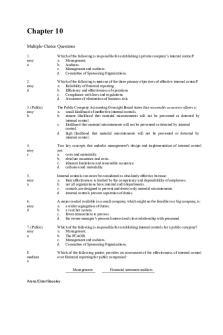
Chapter-10
- 19 Pages
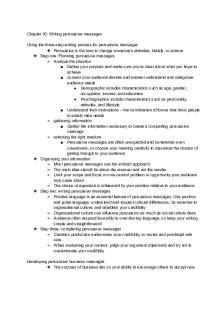
Chapter 10
- 5 Pages
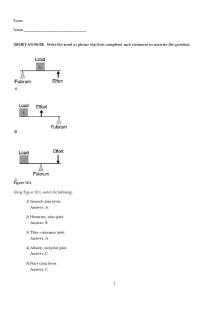
Chapter 10
- 14 Pages

Chapter 10
- 111 Pages
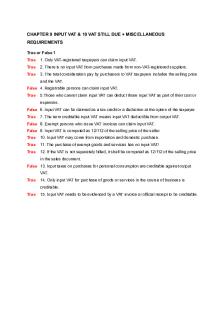
Chapter 10
- 16 Pages
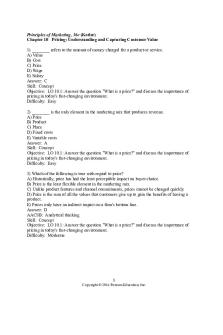
Chapter 10
- 47 Pages
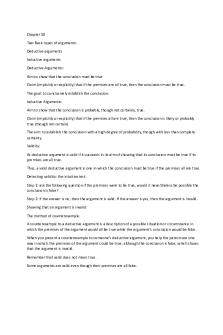
Chapter 10
- 4 Pages
Popular Institutions
- Tinajero National High School - Annex
- Politeknik Caltex Riau
- Yokohama City University
- SGT University
- University of Al-Qadisiyah
- Divine Word College of Vigan
- Techniek College Rotterdam
- Universidade de Santiago
- Universiti Teknologi MARA Cawangan Johor Kampus Pasir Gudang
- Poltekkes Kemenkes Yogyakarta
- Baguio City National High School
- Colegio san marcos
- preparatoria uno
- Centro de Bachillerato Tecnológico Industrial y de Servicios No. 107
- Dalian Maritime University
- Quang Trung Secondary School
- Colegio Tecnológico en Informática
- Corporación Regional de Educación Superior
- Grupo CEDVA
- Dar Al Uloom University
- Centro de Estudios Preuniversitarios de la Universidad Nacional de Ingeniería
- 上智大学
- Aakash International School, Nuna Majara
- San Felipe Neri Catholic School
- Kang Chiao International School - New Taipei City
- Misamis Occidental National High School
- Institución Educativa Escuela Normal Juan Ladrilleros
- Kolehiyo ng Pantukan
- Batanes State College
- Instituto Continental
- Sekolah Menengah Kejuruan Kesehatan Kaltara (Tarakan)
- Colegio de La Inmaculada Concepcion - Cebu

